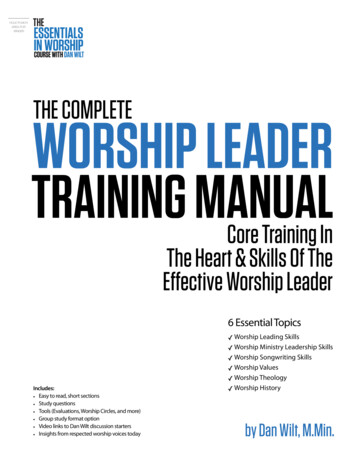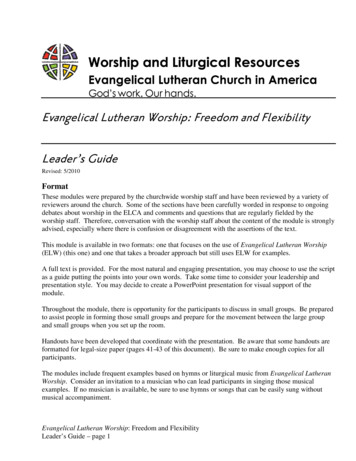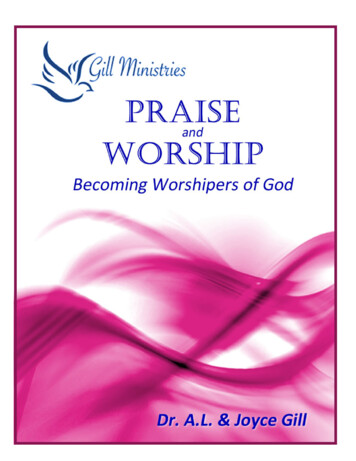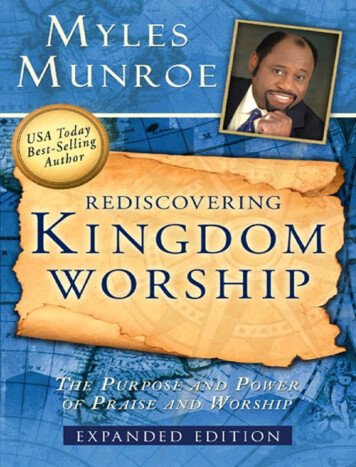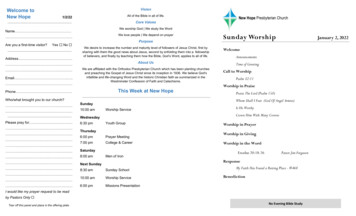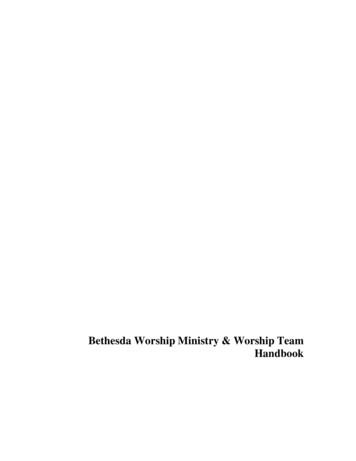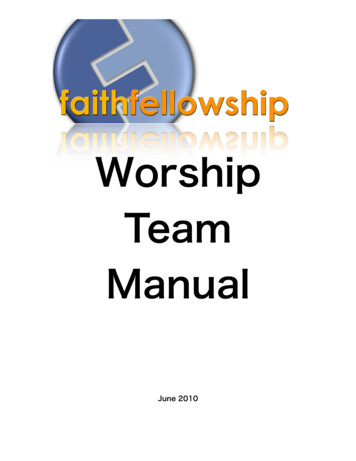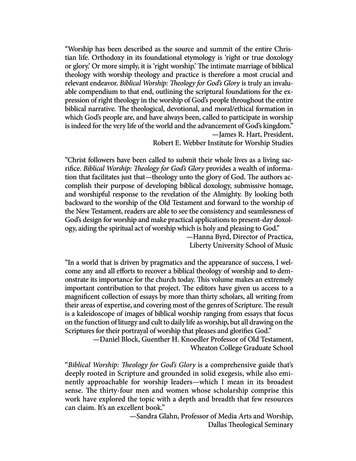
Transcription
“Worship has been described as the source and summit of the entire Christian life. Orthodoxy in its foundational etymology is ‘right or true doxologyor glory.’ Or more simply, it is ‘right worship.’ The intimate marriage of biblicaltheology with worship theology and practice is therefore a most crucial andrelevant endeavor. Biblical Worship: Theology for God’s Glory is truly an invaluable compendium to that end, outlining the scriptural foundations for the expression of right theology in the worship of God’s people throughout the entirebiblical narrative. The theological, devotional, and moral/ethical formation inwhich God’s people are, and have always been, called to participate in worshipis indeed for the very life of the world and the advancement of God’s kingdom.”—James R. Hart, President,Robert E. Webber Institute for Worship Studies“Christ followers have been called to submit their whole lives as a living sacrifice. Biblical Worship: Theology for God’s Glory provides a wealth of information that facilitates just that—theology unto the glory of God. The authors accomplish their purpose of developing biblical doxology, submissive homage,and worshipful response to the revelation of the Almighty. By looking bothbackward to the worship of the Old Testament and forward to the worship ofthe New Testament, readers are able to see the consistency and seamlessness ofGod’s design for worship and make practical applications to present-day doxology, aiding the spiritual act of worship which is holy and pleasing to God.”—Hanna Byrd, Director of Practica,Liberty University School of Music“In a world that is driven by pragmatics and the appearance of success, I welcome any and all efforts to recover a biblical theology of worship and to demonstrate its importance for the church today. This volume makes an extremelyimportant contribution to that project. The editors have given us access to amagnificent collection of essays by more than thirty scholars, all writing fromtheir areas of expertise, and covering most of the genres of Scripture. The resultis a kaleidoscope of images of biblical worship ranging from essays that focuson the function of liturgy and cult to daily life as worship, but all drawing on theScriptures for their portrayal of worship that pleases and glorifies God.”—Daniel Block, Guenther H. Knoedler Professor of Old Testament,Wheaton College Graduate School“Biblical Worship: Theology for God’s Glory is a comprehensive guide that’sdeeply rooted in Scripture and grounded in solid exegesis, while also eminently approachable for worship leaders—which I mean in its broadestsense. The thirty-four men and women whose scholarship comprise thiswork have explored the topic with a depth and breadth that few resourcescan claim. It’s an excellent book.”—Sandra Glahn, Professor of Media Arts and Worship,Dallas Theological Seminary
“In the revelation within the Bible, there is an inexhaustible beauty to God.As nothing limits God’s power or love, there seems to be no limits to theproper wonder and awe of the Lord God, too. Biblical Worship: Theology forGod’s Glory helps us see this amazing breadth of how biblical people haveworshiped the God revealed in the Scriptures. Come, read how biblical authors have been ‘lost in wonder, love, and praise’ and be drawn into the samewith them.”—Lester Ruth, Research Professor of Christian Worship,Duke Divinity School“As believers we are called upon to worship the Lord, and this volume helpsus grasp what the biblical writers mean by worship. We are treated to a guidedtour of the canon by the contributors to the volume, and thereby we are enriched by the diverse expressions of worship in the Scriptures. The significance of the biblical teaching is applied to the contemporary world, and I amgrateful for this fine work which reminds us afresh that we are called upon toworship in spirit and truth.”—Thomas R. Schreiner,James Buchanan Harrison Professor of New TestamentInterpretation, Professor of Biblical Theology,The Southern Baptist Theological Seminary“Worship is at the heart of the Bible, but the changing patterns of worshipthrough the biblical story can be a challenge for readers. This book leaves nopart of the biblical canon out of account and consistently develops the implications for our personal and corporate prayer and worship today.”—Richard Bauckham, Professor Emeritus of New Testament Studies,University of St. Andrews
BIBLICAL THEOLOGY FOR THE CHURCHBIBLICA LWORSHIPTheology for God’s GloryB E N J A M I N K . F O R R E S T,WA LT E R C. K A I S E R J R . ,AND VERNON M. WHALEYEDITORSK R EG ELA C A D E M I C
Biblical Worship: Theology for God’s Glory 2021 by Benjamin K. Forrest, Walter C. Kaiser Jr., and Vernon M. WhaleyPublished by Kregel Academic, an imprint of Kregel Publications, 2450 Oak Industrial Dr.NE, Grand Rapids, MI 49505-6020.All rights reserved. No part of this book may be reproduced, stored in a retrieval system, ortransmitted in any form or by any means—electronic, mechanical, photocopy, recording,or otherwise—without written permission of the publisher, except for brief quotations inprinted reviews.All Scripture quotations, unless otherwise indicated, are from The Holy Bible, EnglishStandard Version (ESV ), copyright 2001 by Crossway, a publishing ministry of GoodNews Publishers. Used by permission. All rights reserved.Scripture quotations marked bsb are from The Holy Bible, Berean Study Bible, BSB. Copyright 2016, 2018 by Bible Hub. Used by permission. All rights reserved worldwide.Scripture quotations marked hcsb are from the Holman Christian Standard Bible . Copyright 1999, 2000, 2002, 2003 by Holman Bible Publishers. Used by permission. Scripturequotations marked ksv are from the King James Version.Scripture quotations marked nasb are from the New American Standard Bible . Copyright 1960, 1962, 1963, 1968, 1971, 1972, 1973, 1975, 1977, 1995 by The Lockman Foundation.Used by permission. www.Lockman.orgScripture quotations marked net are taken from New English Translation (NET). NETBible copyright 1996-2017 by Biblical Studies Press, L.L.C. http://netbible.com All rightsreserved.Scripture quotations marked nets are taken from A New English Translation of the Septuagint, 2007 by the International Organization for Septuagint and Cognate Studies, Inc.Used by permission of Oxford Univeristy Press. All rights reserved.Scripture quotations marked niv are from the Holy Bible, New International Version ,NIV . Copyright 1973, 1978, 1984, 2011 by Biblica, Inc. Used by permission ofZondervan. All rights reserved worldwide. www.zondervan.comScripture quotations marked nkjv are from the New King James Version . Copyright 1982 by Thomas Nelson, Inc. Used by permission. All rights reserved.Scripture quotations marked nlt are from the Holy Bible, New Living Translation, copyright 1996, 2004, 2007 by Tyndale House Foundation. Used by permission of TyndaleHouse Publishers, Inc., Carol Stream, Illinois 60188. All rights reserved.Scripture quotations marked nrsv are from the New Revised Standard Version Bible,copyright 1989 by the National Council of the Churches of Christ in the U.S.A. Used bypermission. All rights reserved.Scripture quotations marked tniv are from the HOLY BIBLE, TODAY’S NEW INTERNATIONAL VERSION . Copyright 2001, 2005 by Biblica . Used by permission of Biblica .All rights reserved worldwide.Scripture quotations not marked are the author’s own translation.ISBN 978-0-8254-4556-9Printed in the United States of America21 22 23 24 25 / 5 4 3 2 1
To Reagan Adeline Forrest,may you raise your voice and spend yourlife in worship of our wonderful Savior!—BKFTo my wife Nancy Elizabeth,who loves to sing with me the songs ofpraise and worship to our Lord every day!—WCKTo Dr. Paul Rumrill,lover of “the Most High God,” powerful prayerpartner, student of worship, true friend, and comrade.—VMW
CONTENTSACKNOWLEDGEMENTS . . . . . . . . . . . . . . . . . . . . . . . . . . . . . . . . . . . . . . . . . . . . 9ABBREVIATIONS . . . . . . . . . . . . . . . . . . . . . . . . . . . . . . . . . . . . . . . . . . . . . . . . . . . 11CONTRIBUTORS . . . . . . . . . . . . . . . . . . . . . . . . . . . . . . . . . . . . . . . . . . . . . . . . . . . 15INTRODUCTION: Worship as Theology for God’s Glory – Benjamin K.Forrest, Walter C. Kaiser Jr., and Vernon M. Whaley. . . . 18WORSHIP IN THE OLD TESTAMENTCHAPTER 1: Worship: A Concept Study in Biblical Hebrew– Peter Y. Lee . . . . . . . . . . . . . . . . . . . . . . . . . . . . . . . . . . . . . . . . . . 23CHAPTER 2: Royal Priests Created to Worship: Worship inthe Garden . . . and Beyond – William R. Osborne. . . . . . . . . . 37CHAPTER 3: Drawing Near to a Holy God: Priestly Worshipin the Tabernacle – Christine Elizabeth Palmer. . . . . . . . . . . . . 51CHAPTER 4: The Calendar for Worship in Ancient Israel: Worshipin the Feasts and Celebrations – JoAnna M. Hoyt . . . . . . . . . . 68CHAPTER 5: Trust and Obedience as Worship to Yahweh:Worship in the Book of Joshua – J. Michael Thigpen . . . . . . . . 82CHAPTER 6: Deteriorating Devotion among God’s People:Worship in the Book of Judges – Jillian L. Ross. . . . . . . . . . . . . 97CHAPTER 7: Sacred Places, Acts, Times, and People in the Worshipof Yahweh: Worship in Israel’s United Monarchy– Eugene Merrill . . . . . . . . . . . . . . . . . . . . . . . . . . . . . . . . . . . . . . 120CHAPTER 8: Kingship and Faithfulness: Worship and theDivided Kingdom – N. Blake Hearson . . . . . . . . . . . . . . . . . . . 137CHAPTER 9: The Context of Worship in the Psalter – Walter C.Kaiser Jr., Willem A. VanGemeren, and Erika Moore . . . . . . . 155CHAPTER 10: Covenant Hope in the King Regardless of Circumstances:Worship in Book 1 (1–41) of the Psalter – Erika Moore . . . . 163CHAPTER 11: The Call and Cause to Praise: Worship inBook 2 (42–72) of the Psalter – Ted Hildebrandt . . . . . . . . . . 176CHAPTER 12: Worship as Covenantal Dialogue: Worship inBook 3 (73–89) of the Psalter – Dickson Ngama . . . . . . . . . . 190CHAPTER 13: Praising the King Who Reigns: Worship in Book 4(90–106) of the Psalter – Walter C. Kaiser Jr. . . . . . . . . . . . . . 206CHAPTER 14: Responding to the Questions Brought by the Hiddennessof God: Worship in Book 5 (107–50) of the Psalter– Willem A. VanGemeren and Jinsung Seok. . . . . . . . . . . . . . . 214CHAPTER 15: Trusting in the Sovereignty of Yahweh: Worshipin the Hebrew Megilloth – Mark Rooker . . . . . . . . . . . . . . . . . 229
CHAPTER 16: Hearing, Responding, and Submitting to the Voiceof God: Worship in Isaiah – John Oswalt . . . . . . . . . . . . . . . . . 244CHAPTER 17: True Knowledge of God and the Transformation of theHeart: Worship in Jeremiah and Ezekiel – Gary Yates. . . . . . 256CHAPTER 18: True Worship versus False Worship: Worshipin the Preexilic Minor Prophets – R. Alan Fuhr . . . . . . . . . . . 271CHAPTER 19: Reestablishing Righteous Worship: Worship in Ezra– Donna Petter. . . . . . . . . . . . . . . . . . . . . . . . . . . . . . . . . . . . . . . . 281CHAPTER 20: Protecting the Sanctity of Zion: Worship in Nehemiah– Thomas Petter. . . . . . . . . . . . . . . . . . . . . . . . . . . . . . . . . . . . . . . 299CHAPTER 21: Restoring Proper Relationship with Yahweh: Worshipin the Postexilic Minor Prophets – Andrew Hill . . . . . . . . . . . 310WORSHIP IN THE NEW TESTAMENTCHAPTER 22: Worship: A Concept Study in New Testament Greek– Craig L. Blomberg and Ben R. Crenshaw. . . . . . . . . . . . . . . . 332CHAPTER 23: A Proper Worship of Yahweh: Worshiping Jesus inthe Synoptics – Monte Shanks . . . . . . . . . . . . . . . . . . . . . . . . . . 350CHAPTER 24: Jesus as the Temple and the Fulfillment of the Feasts:Worship in John – Donald Roe Love III . . . . . . . . . . . . . . . . . . 364CHAPTER 25: Life Together in the Last Days: Worship in the Actsof the Apostles – Brian J. Tabb . . . . . . . . . . . . . . . . . . . . . . . . . . 377CHAPTER 26: Unity in Christ: Worship in the Corinthian Church– Benjamin L. Gladd. . . . . . . . . . . . . . . . . . . . . . . . . . . . . . . . . . . 397CHAPTER 27: Worship Rooted in Doctrine for Life: Worship inGalatians and Romans – Kenneth Berding. . . . . . . . . . . . . . . . 410CHAPTER 28: Doing All Things in the Name of the Lord: Worshipin the Prison Epistles – A. Chadwick Thornhill. . . . . . . . . . . . 428CHAPTER 29: The Word, Prayer, and Practice: Worship in thePastoral Epistles – Ray Van Neste. . . . . . . . . . . . . . . . . . . . . . . . 441CHAPTER 30: The Superiority and Worship of Christ: Worshipin Hebrews – Dickson Ngama . . . . . . . . . . . . . . . . . . . . . . . . . . 455CHAPTER 31: Grounded in Allegiance to Christ and Affection for God:Worship in John’s Letters – Andreas Köstenberger . . . . . . . . . 469CHAPTER 32: God’s Spiritual House: Worship in 1 Peter– Karen Jobes . . . . . . . . . . . . . . . . . . . . . . . . . . . . . . . . . . . . . . . . . 481CHAPTER 33: Worship as Resistance and Embrace: Worship in2 Peter and Jude – Greg Couser . . . . . . . . . . . . . . . . . . . . . . . . . 490CHAPTER 34: Hallelujah, What a Savior! Worship in the Apocalypse– Edward E. Hindson . . . . . . . . . . . . . . . . . . . . . . . . . . . . . . . . . . 503EPILOGUE:Biblical Worship for the Glory of God– Benjamin K. Forrest and Vernon M. Whaley . . . . . . . . . . . . 515SCRIPTURE INDEX . . . . . . . . . . . . . . . . . . . . . . . . . . . . . . . . . . . . . . . . . . . . . . . . 517
CONTRIBUTORSKenneth Berding (PhD, Westminster Theological Seminary) is professorof New Testament at Talbot School of Theology.Craig L. Blomberg (PhD, University of Aberdeen) is distinguished professor of New Testament at Denver Seminary.Greg Couser (PhD, University of Aberdeen) is senior professor of Bibleand Greek at Cedarville University.Ben R. Crenshaw is a doctoral student at Hillsdale College.Benjamin K. Forrest (EdD, Liberty University) is associate dean of theCollege of Arts and Sciences and professor of Christian education at Liberty University.R. Alan Fuhr (PhD, Southeastern Baptist Theological Seminary) is associate professor of Old Testament at Liberty University.Benjamin L. Gladd (PhD, Wheaton College) is associate professor of NewTestament at Reformed Theological Seminary in Jackson.N. Blake Hearson (PhD, Hebrew Union College) is associate professor ofOld Testament at Midwestern Baptist Theological Seminary.Ted Hildebrandt (PhD, Grace Theological Seminary) is professor of biblical studies at Gordon College.Andrew Hill (PhD, University of Michigan) is professor of Old Testamentat Wheaton College.Edward E. Hindson (ThD, Trinity Graduate School; DMin, WestminsterTheological Seminary; DPhil, University of South Africa) is the foundingdean of the John W. Rawlings School of Divinity and Distinguished Research Professor at Liberty University.JoAnna M. Hoyt (PhD, Dallas Theological Seminary) is an adjunct professor at Dallas International University, a visiting professor at Dallas15
16ContributorsTheological Seminary, and assistant editor for the Evangelical ExegeticalCommentary Series.Karen Jobes (PhD, Westminster Theological Seminary) is professor ofNew Testament Greek and exegesis, emerita, at Wheaton College.Walter C. Kaiser Jr. (PhD, Brandeis University) is the Colman M. Mockler Distinguished Professor of Old Testament and president emeritus ofGordon-Conwell Theological Seminary.Andreas Köstenberger (PhD, Trinity Evangelical Divinity School; Dr. rer.soc. oec., Vienna University of Economics) is research professor of NewTestament and biblical theology and director of the Center for BiblicalStudies at Midwestern Baptist Theological Seminary.Peter Y. Lee (PhD, Catholic University of America) is professor of OldTestament and dean of students at Reformed Theological Seminary inWashington, DC.Donald Roe Love III (PhD, Southeastern Baptist Theological Seminary)is associate professor of New Testament at Liberty University.Eugene Merrill (PhD, Columbia University; PhD, Bob Jones University)is distinguished professor emeritus of Old Testament studies at DallasTheological Seminary.Erika Moore (PhD, Westminster Theological Seminary) is academic dean,professor of Old Testament and Hebrew, and director of the STM programat Trinity School for Ministry.Dickson Ngama (PhD, Westminster Theological Seminary; PhD ABD,Liberty University) is instructor of Old Testament and theology at LibertyUniversity.William R. Osborne (PhD, Midwestern Baptist Theological Seminary) isassociate professor of Biblical and Theological Studies at the College of theOzarks.John Oswalt (PhD, Brandeis University) is visiting distinguished professorof Old Testament at Asbury Seminary. He is author of Isaiah in the NIVAC.Christine Elizabeth Palmer (PhD, Hebrew Union College) is instructorof Old Testament exegesis and biblical theology at Gordon-Conwell Theological Seminary.
Contributors17Donna Petter (PhD, University of Toronto) is director of the HebrewLanguage Program and associate professor of Old Testament at GordonConwell Theological Seminary.Thomas Petter (PhD, University of Toronto) is Senior Pastor, Trinitarian Congregational Church, Wayland, MA, and associate professor of OldTestament, Gordon-Conwell Theological Seminary.Mark Rooker (PhD, Brandeis University) is senior professor of Old Testament at Southeastern Baptist Theological Seminary.Jillian L. Ross (PhD, Trinity Evangelical Divinity School) is associate professor of biblical studies and director of biblical languages programs atLiberty University.Jinsung Seok (PhD, Trinity Evangelical Divinity School) is an adjunctprofessor at Sungkyul University and a pastor in South Korea.Monte Shanks (PhD, Southern Baptist Theological Seminary) is assistantprofessor of New Testament at Liberty University.Brian J. Tabb (PhD, London School of Theology) is the academic dean andassociate professor of Biblical Studies at Bethlehem College & Seminary.J. Michael Thigpen (PhD, Hebrew Union College) is executive vice president, provost, and professor of Old Testament at Phoenix Seminar.A. Chadwick Thornhill (PhD, Liberty University) is graduate programdirector of biblical and theological studies as well as associate professor ofbiblical studies.Willem A. VanGemeren (PhD, University of Wisconsin) is professoremeritus of Old Testament and Semitic languages at Trinity EvangelicalDivinity School.Ray Van Neste (PhD, University of Aberdeen) is dean and professor ofbiblical studies, School of Theology and Missions at Union University.Vernon M. Whaley (PhD, University of Oklahoma) is associate vice president of program development and professor of worship at the School ofMusic and Worship Arts at Trevecca Nazarene University.Gary Yates (PhD, Dallas Theological Seminary) is professor of Old Testament at Liberty University.
INTRODUCTION:WORSHIP AS THEOLOGYFOR GOD’S GLORYBenjamin K. Forrest, Walter C. Kaiser Jr.,and Vernon M. WhaleyThe story of biblical worship is one where the common is made sacredby proximity to that which is uncommon. From the beginning Godsought to call out a people for a unique relationship from among creation.Time and again, however, humankind tarnished the sacred, but God in hisprovidence has offered redemption. Redemption ultimately comes throughChrist, but the story leading to Christ takes us through a journey spread overthousands of years where sacred places were constructed (Exod. 26), moved(Num. 1:51), built (1 Kings 6), and torn down (2 Kings 25), all leading to athe wonderful revelation in John 4, where Christ tells of a day when placewill not matter for worship (John 4:19–22) because the people of God willbecome his dwelling place (1 Cor. 3:16; Acts 1:8), as we worship in Spirit andtruth (John 4:23–24). This story leading to Christ through worship also travels through paths showing the need for sacred people who perform sacredrituals. Here mediators intercede on behalf of a sinful people to propitiate thesin of individuals and of a nation (Exod. 30:1–10; Lev. 6, 16). These ritualsare filled with meaning (Lev. 1), symbolism (Lev. 16:20–22), and significance(Exod. 12:21–28; cf. Num. 19:1–10; Heb. 9:11–28), and the people divinelychosen to carry these out have been set apart for this work (Num. 8:5–26).But both the people and the ritual fail to bring about lasting worship—forthese are imperfect pictures of what is only perfected in Christ, who is the“only mediator between God and man” (2 Tim. 2:15) and the only sacrificethat wholly cleanses from all unrighteousness (1 John 1:9). Last, we also seethat throughout this story, time too is sacred. Seasons are set apart for feastsand fasts, where strict observance of worship is not only expected but alsorequired. Yet as the story continues from the wilderness to the kingdoms toexile and return, we see a people falling short of the expectations clearly laidout in the law (Ezra 9–10). As Christ came, however, he ushered in a new18
Introduction: Worship as Theology for God’s Glory19dispensation that will ultimately find its fulfillment in a heavenly feast wherebride and groom join together forever (Rev. 19:6–9). This is the story of biblical worship. It begins with a commission, in the beginning, to worship (Gen.1–3; cf. Exod. 20; Deut. 5), and it ends in the culmination of a heavenly hostsinging the eternal praise of the one who is worthy (Rev. 19:1–8).If this is the story of biblical worship, it is proper to situate ourselveswithin this story, learning from both righteous and wayward worship thatwe might faithfully join in the song of the redeemed (Ps. 107:1–3; Rev. 5:9;14:1–5). Worship then is not dictated by those who bring it, but by the onewho commissions it and is worthy of its reception (Exod. 25–31; 2 Sam.6:1–7; 1 Chron. 29; 1 Kings 6:11–13; 8:1–66). Therefore, what God has saidabout worship must be our pursuit for our worshiping. And so to understand our call to worship, we must turn to Scripture humbly and honestlyasking that we might understand our calling to worship well. This pursuit isnot one we can master in our own endeavoring, but an obedient response tothat which has been laid out in the pages of Scripture for the people of God.Right worship is thus eternal, for the object of our worship has no end, andthis worship in which we now join will be our vocation throughout eternity.THEOLOGY UNTO THE GLORY OF GODHumanity was made to worship and this truth is ingrained on ourhearts for, as Augustine noted, “our heart is restless until it rests in you.”1Worship of God, rightly expressed, satisfies our deepest hungers andthirsts because this is what we were made for. God has revealed himself tohumanity in his written Word and the Word that became flesh. J. I. Packerhas said, “Theology is for doxology.” Understanding the Word and theWord ultimately is for worship. For Packer, doxology is “glorifying God bypraise and thanks, by obedient holiness, and by laboring to extend God’skingdom, church, and cultural influence.”2 And it is this idea that standsbehind the conviction of this project. We believe that theology is worship,and that worship must be theological. Therefore, biblical worship is theology unto the glory of God. Nothing less is acceptable. But what is worship,and how to do we understand the way that places, people, ritual, and timeplay into our rightful worshiping? Two helpful definitions can begin toanswer this first question, and we hope that the following chapters beginto answer the second. Daniel Block defines worship as “reverential humanacts of submission and homage before the divine Sovereign in response tohis gracious revelation of himself and in accord with his will,”3 while Allen1.2.3.Augustine, Confessions 1.1.1J. I. Packer, “Reading the Bible Theologically,” in Understanding Scripture: An Overview of theBible’s Origin, Reliability, and Meaning, eds. Wayne Grudem, C. John Collins, and Thomas R.Schreiner (Wheaton, IL: Crossway, 2012), 34.Daniel I. Block, For the Glory of God: Recovering a Biblical Theology of Worship (Grand Rapids:Baker Academic, 2014), 23.
20Introduction: Worship as Theology for God’s GloryRoss says that worship is an “appropriate response to the revelation of theholy God of glory.”4 If worship is theology as we have proposed, submission as Block has stated, and a response to summarize Ross’s definition,then our exploration in the coming chapters must cultivate these threedispositions at the very least, and that surely is our goal. We hope thatreaders will grow in their theology as doxology, their submissive homage,and their responsiveness to God’s revelation of himself.EDITORIAL CONVICTIONSOur pursuit of accomplishing such lofty goals is imperfect at best, butnonetheless, it is our best attempt at faithfully accomplishing such a holyaim. What will soon follow is a series of chapters working out from Scripture what various portions of the biblical text have to say about worship.Each chapter has organizational similarities while allowing for the voicesof each author to tell their story from their study and their expertise. Authors were tasked to tell this story using the organizational tools of context, theology, and significance, and so each chapter is built around thesethree headings so as to situate the theology of worship in the context ofthe text so that application could faithfully follow. There is much moreto say on each of these chapters—these surely will not be the final wordon worship in their corresponding portions of Scripture—but we hopethat readers will find them encouraging to their souls and useful in theirteaching, preaching, and practice. This book is aimed at Christians whowant to worship well, according to Scripture. It does not discuss stylistic ordenominational approaches to worship. Instead it is a biblical-theologicalapproach to the text to ask how the context of a passage bears on the theology and what this theology then leads to with regard to significance. It isour belief that this approach compels our worship in the right direction,and then allows for cultures and denominations to decide on its practicefrom an informed position.If the story of biblical worship intends to include us in its composition, then we must turn to the text and ask how we might posture ourselves to worship well according to all that God has laid out. It is our hopethat readers will situate themselves within this story and learn from it,so that we might join early with the heavenly hosts singing praises to theLamb who sits on the throne (Rev. 5).4.Allen P. Ross, Recalling the Hope of Glory: Biblical Worship from the Garden to the New Creation(Grand Rapids: Kregel Academic, 2006), 50.
WORSHIPin theOLD TESTAMENT
CHAPTER 1WORSHIP: A CONCEPT STUDY INBIBLICAL HEBREWPeter Y. LeeWorship is at the very heart of the Old Testament. There seems verylittle doubt about this assertion. To be in the presence of the Lordin his house of worship represented one of the highest expressions of theblessed life, if not the highest. The psalmist in Psalm 84:10 describes suchcontentment that comes from worship when he says, “For a day in yourcourts is better than a thousand elsewhere. I would rather be a doorkeeper in the house of my God than dwell in the tents of wickedness.”1A similar sense of bliss is mentioned in Psalm 27:4: “One thing have Iasked of the Lord, that will I seek after: that I may dwell in the houseof the Lord all the days of my life, to gaze upon the beauty of the Lordand to inquire in his temple.” These two poetic declarations are samplesof countless others in the pages of Scripture that state the genuine joyfound in the true, godly worship of God (see Ps. 36:7–9; 47:1–12; Isa.2:2–3; 44:28; Jer. 3:17–18; Mic. 4:1–3).In many ways, the entire direction and flow of the history of Israelpivots on this aspect of worship. When Israel was properly worshipingthe Lord, all was well. It is when they engaged in improper worship thattheir life began to collapse. The zeal that the Lord had for his own glorywould not permit such impropriety in the worship life of his chosenpeople (see Exod. 20:3; Isa. 43:25; 48:9–11; 49:3; Ezek. 36:22–23; Ps.106:7–8; Rom. 9:17). He revealed to them set standards on how worshipis to be done, and he would not settle for anything less. Above all else,Israel’s worship was required to be in accordance to his revealed Word.1.In the MT, this is verse 11.23
24Peter Y. LeeWord 1Word 4Word 2Word 3But what was that biblical standard of worship? The intent of this volume is to answer that very question. This opening chapter will introducekey concepts that make up a biblical understanding of worship by examining key words and translational methodologies in Biblical Hebrew. Although there is some semantic overlap, certain words in Biblical Hebrewprovide a particular contribution to comprehending the Israelites’ worshiplife. It is the combination of these words that clarifies the concept of worship in the Old Testament (see diagram). The investigation of these wordswill reveal what it meant for the people of the Old Testament to participatein proper worship of the Lord. Although such an approach cannot addressevery detail in the worship life of ancient Israel, it will nonetheless give aframework on which Israel engaged in their devotions to their Sovereign.From this study, we will see the following five principles clarified as weexplore the semantic domains that make up a study of worship: (1) sacredjourney, (2) sacred structures, (3) sacred practices, (4) sacred disposition,(5) and a sacred goal.WORSHIP AS CONCEPT IN TRANSLATIONAL PRACTICEBefore our study begins, we begin with two brief comments on methodology. The first is regarding the choice of Hebrew words examined below.There are words in Biblical Hebrew that can be properly translated “worship.”
Chapter 1—Worship: A Concept Study in Biblical Hebrew25However, there are a number of other words that cannot be translated assuch yet are included in this study. The reason for this is because the concept
“Christ followers have been called to submit their whole lives as a living sac - ri"ce. Biblical Worship: !eology for God’s Glory provides a wealth of informa-tion that facilitates just that—theology unto the glory of God. !e authors ac - complish their pu
